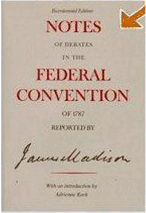

 |  |
Debates at the Convention
|
Please go to the new Coffee Coaster site implemented more gracefully in Wordpress. This page @ http://brianrwright.com/CoffeeCoasterBlog/?p=3240 |
 All right, unless you have access to some primo bud (really smooth marijuana conducive to cognition), reading this book may prove to be tedious business. Candidly, it needs to be considered
a reference, quite an amazing reference, to the founding document of the American nation.[1]
Necessarily, a great deal of the back and forth concerns procedural matters, such as how many senators, reps, terms of office, judicial powers, general composition, qualifications, impeachability, and so on. And these questions are of interest to scholars certainly, to laymen as well. For example, you learn fairly quickly that the high-population states and low-population states tended to have opposed objectives: mainly that the one group should not be allowed to run roughshod over the other.
All right, unless you have access to some primo bud (really smooth marijuana conducive to cognition), reading this book may prove to be tedious business. Candidly, it needs to be considered
a reference, quite an amazing reference, to the founding document of the American nation.[1]
Necessarily, a great deal of the back and forth concerns procedural matters, such as how many senators, reps, terms of office, judicial powers, general composition, qualifications, impeachability, and so on. And these questions are of interest to scholars certainly, to laymen as well. For example, you learn fairly quickly that the high-population states and low-population states tended to have opposed objectives: mainly that the one group should not be allowed to run roughshod over the other.
How did I learn about this fine book? It was at Liberty Forum 2009, when I first presented (to the Altexpo group[2], which was banished that year to a closet-sized personal suite) my concept and first edition of the book: The Sacred Nonaggression Principle (SNaP). In the audience was an intense, distinguished older man, who recommended Madison's work... for the particular reason that it describes the battle between the power-centralists and the power-dispersionists. I wrote up the encounter in my notes on Liberty Forum 2009, here:
After my talk, I receive quite an honor from a former NH representative Henry McElroy, who walks up and points me toward an important work by James Madison: Notes on the 1787 Federal Convention. Henry tells me that Madison had kept his notes private until all the attendees had died; what is revealed is the intention of many of those attendees to be very aggression-oriented toward the several states and against the rights of the people.
Henry further recommended that my SNaP idea was the perfect complement to what many were doing with the Democracy School movement, which essentially takes power back from the state and its privileged money-power corporations... especially at the local level. [I haven't hooked up yet, but I have read up, and this is what self-government and stickin' it to The Man is all about... the SNaP in practice.] Back to the book, it did seem to me that when significant decisions were made, the good guys prevailed, though not often by a wide margin. Here is a segment from the discussion of empowerment of the feds over the state militias:
Mr. Ellsworth was for going as far in submitting the militia to the General [federal] Government as might be necessary, but thought the motion of Mr. Mason went too far. He moved that the militia should have the same arms & exercise and be under rules established by the Gen. Gov. when in actual service of the U. States and when States neglect to provide regulations for militia, it sh be regulated & established by the Legislature of U.S. The whole authority over the Militia ought by no means to be taken away from the States whose consequence would pine away to nothing after such a sacrifice of power...
Clearly, the states prevailed on local control of militia, but it wasn't a slam dunk by any means. Many discussions suggest longstanding human conditions, such as the tendency of governments to serve money power insiders (the aristocracy) rather than the people:
Mr. Mercer. It is a first principle of political science that wherever the rights of property are secured, aristocracy will grow out of it. Elective Governments also necessarily become aristocratic, because the rulers being few can & will draw emoluments for themselves from the many. The Governments of America will become aristocracies. They are so already. The public measures are calculated for the benefit of the Governors, not of the people. The people are dissatisfied & complain. They change their rulers, and the public measures are changed, but it is only a change of one scheme of emolument to the rulers for another. The people gain nothing by it, but an addition of instability & uncertainty to their other evils—Government can only be maintained by force or influence [italics in the book]....
Sounds like Sovereign Lloyd from the modern Free State town of Grafton! :) But you get the idea: among a fair share of the people's reps, there wasn't a lot of love for government back then no matter how imaginatively a bunch of men of letters might try to confine it.
Finally, the notes include longer and more philosophical monologues showing not only a broad understanding of history, but self-awareness of America's unique place in it. One such four-page passage from Mr. Pinkney begins as follows:
The efficacy of the System will depend on this article [the distribution of powers outlined in the first three major sections]. In order to form a right judgment in the case, it will be proper to examine the situation of this Country more accurately than it has yet been done. The people of the U. States are perhaps the most singular of any we are acquainted with. Among them there are fewer distinctions of fortune & less of rank, than among the inhabitants of any other nation. Every freeman has a right to the same protection & security...
Which buttresses one of my favorite quotes from John Adams, written about the conditions of mind attending the late War for Independence:
The Revolution was effected before the War commenced. The Revolution was in the minds and hearts of the people; a change in their religious sentiments of their duties and obligations ... This radical change in the principles, opinions, sentiments, and affections of the people, was the real American Revolution.
Notes on the Convention gives us a phenomenal insight into those "principles, opinions, sentiments, and affections" as they played out to give us the First Grand Attempt to produce self-government based on the consent of the governed. At least on the implied consent.[3] It's a 10-star book and should be required reading for anyone learning—or teaching—the subject of the US Constitution.
[1] The simple fact of its existence is astounding. James Madison took copious notes on all the discussions and debates during a hot summer in Philadelphia during the creation of the first real attempt in history to create a social system based on the 'concept of individual rights' (or, if you prefer, 'the nonaggression principle). The book is a testimonial to the stamina and dedication of this remarkable man; it may be added "J. Madison's" own comments are also documented... which prove to be of the more sane and freedom-friendly nature of all the delegate arguments.
[2] It never fails, whenever I speak at the Altexpo events—the FSP main event organizers have never seemed receptive to having me as a presenter—I feel as a child going to Thanksgiving dinner with my parents and having to eat with the other kids at the card table in the corner.
[3] Implied consent, as we learned from Lysander Spooner, is not much consent at all. The next iteration in self-government will be panarchy: full "consent of the governed" meaning freedom of choice of governments.
###
2010 December 17
Copyright © Brian Wright | The Coffee Coaster™
1787 Convention | James Madison | Constitutional Liberty | US Liberty

Click banner to order, click here for book review
 |
||||